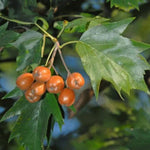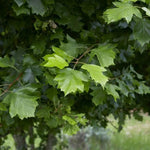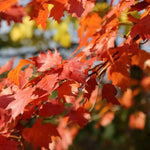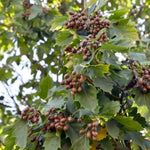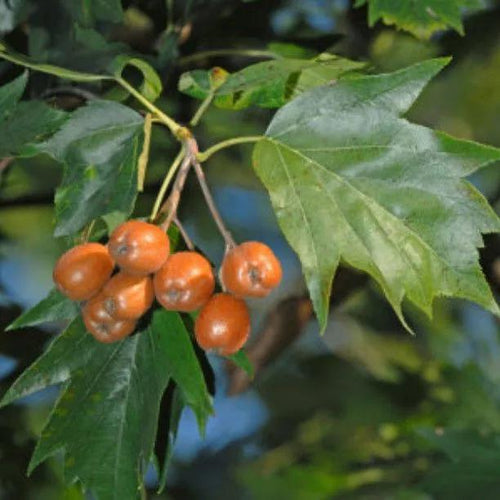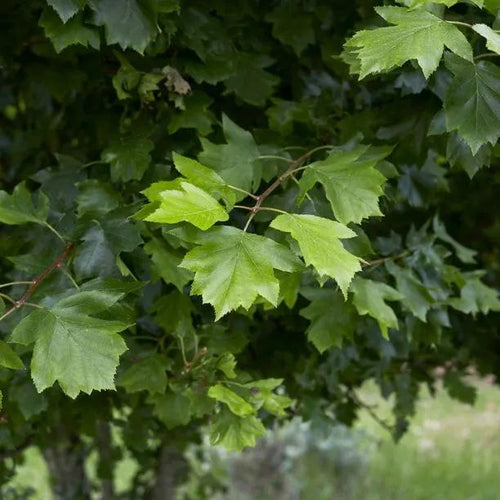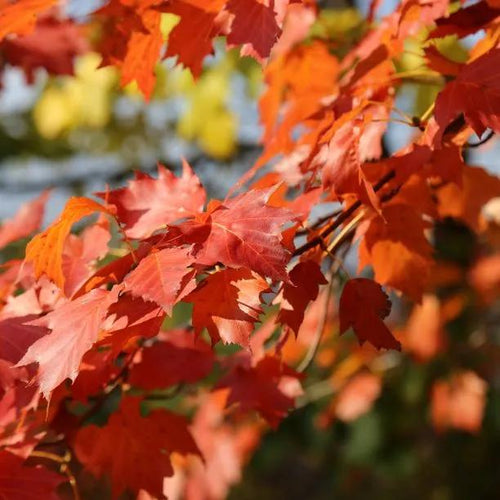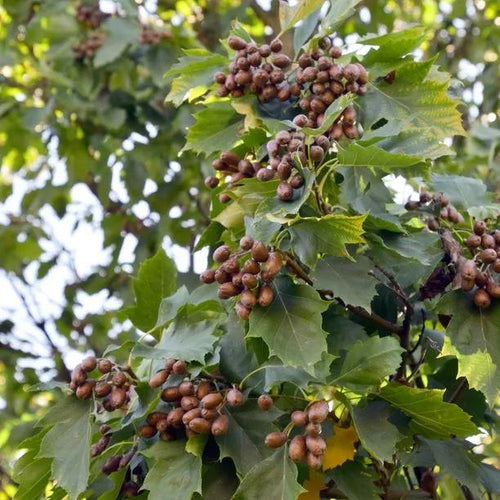 Delivered across the UK
Delivered across the UK Which Best Plant Supplier 2025
Which Best Plant Supplier 2025 1 Year Bareroot Plant Guarantee
1 Year Bareroot Plant Guarantee
About Wild Service Trees, Large
Wild Service Trees, Large Standards
Sorbus torminalis, the Wild Service Tree, is a native deciduous tree with edible fruit.
It has a beautiful form, with upright, sweeping branches, coated in deeply textured bark. As the tree ages, the rough young bark begins to crackle into vaguely rectangular scales that gradually flake off, creating a sort of chequered effect that might be the root of one of its common names, the chequer or checker tree.
The broad, glossy, deeply toothed leaves look a bit like a maple and turn into a lovely range of bronze yellows and russet reds in autumn. It produces lots of small clusters (corymbs) of white flowers in May that point upwards out of the foliage, making them more visible for you and for the insects that they want to attract.
Although it's not grown for its fruit in modern times, a Wild Service tree's produce is a fun addition to any fruit lover's collection once you have all your essential fruit trees planted.
Very much one to share with the birds, the small fruit have a good texture and flavour after being kissed by frost, softening them - this is known as Bletting, same as with Medlar fruit.
It can reach a height of 13-15 metres, exceptionally over 20.
Browse our variety of large garden trees or our full range of trees.
Delivery season: Wild Service trees are delivered bareroot during late autumn and winter, approximately November-March inclusive.
Choosing a size: Small trees are cheaper, easier to handle and more forgiving of less than ideal aftercare, so they're best for a big planting project. If instant impact is your priority, or if you are only buying a few plants for use in a place where it's convenient to water them well in their first year, then you may as well use bigger ones. All our bareroot trees are measured by their height in centimetres above the ground (the roots aren't measured).
Features
- Height: 15m
- Soil: Almost any
- Colour: White flowers in May
- Edible fruit require bletting (freeze-thaw): small but tasty.
- Native
- RHS Plants for Pollinators
- Bareroot delivery only: November-March
Growing Wild Service Trees
Very flexible: it prefers deep, fertile, moist lowland sites, where it'll tolerate light shade, but will grow perfectly well in dry chalky or sandy soils as long as it has plenty of sun. It doesn't mind a bit of waterlogging in winter.
History & Trivia
People who are in the know about traditional British fruit call the brown berries that ripen in late autumn chequers (or checkers) and, prior to the use of hops, they were much in demand for brewing beer: many pubs still use the word chequers in their name.
They are one of our most interesting native fruits, similar to a date but with more of a fruity flavour. The trick is to eat them at the right time: when they are over-ripe and have been frozen and thawed a couple of times by frosts (or your freezer). This is called bletting (as you would with medlars), which is not the same as rotting (that's when bacteria and fungi get inside and muck it up), so don't let the squidgy texture put you off.
It has been claimed that the official country home of the incumbent Prime Minister, Chequers Court, is named after this tree, though this is probably a coincidence. Its other common name, the wild service tree, may have something to do with spring time church services and in some areas the word service has been replaced with sarvis.
Once common and widely harvested, Wild service trees are now quite rare in Britain, mostly found in old, undisturbed forests. Despite being native, its strong suckering habit is the main reason why it is still around, as the seeds are barely able to grow into mature trees without human assistance. They won't germinate if the winter isn't cold enough, and will die if the summer isn't the right blend of rain and sun, and not too cool and cloudy. On lucky years when all those conditions are met, most seedlings get eaten by fungi or slugs as soon as they begin to sprout! Finally, those that pull through their first year are typically out-competed for light by other plants. Research in Epping forest has shown that the wild service trees there have grown from the suckers of older versions of themselves over many centuries, with none of the trees studied having grown from seed during that time.
Standard trees are measured by their girth in centimetres 1 metre above ground level: their trunk's waist measurement. Unlike sapling trees and hedge plants, standards aren't measured by their height, which will vary quite a bit both between and within species.
So, a 6/8cm standard tree has a trunk with a circumference of 6-8cm and an 8/10 standard has a trunk 8-10cm around. This measurement makes no difference to the tree's final height.
On average, standard trees are 2-3.5 metres tall when they arrive, but we cannot tell you precisely how tall your trees will be before we deliver them.













 Secure, One-Tap Checkout
Secure, One-Tap Checkout
 Hand Picked, Delivered to Your Door!
Hand Picked, Delivered to Your Door! 1 Year Bareroot Guarantee
1 Year Bareroot Guarantee